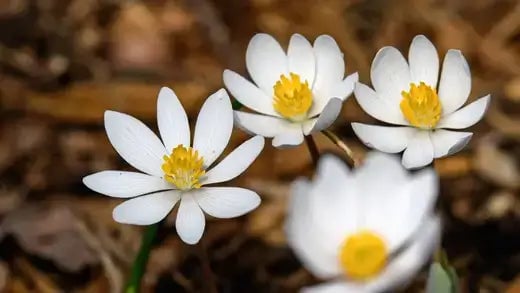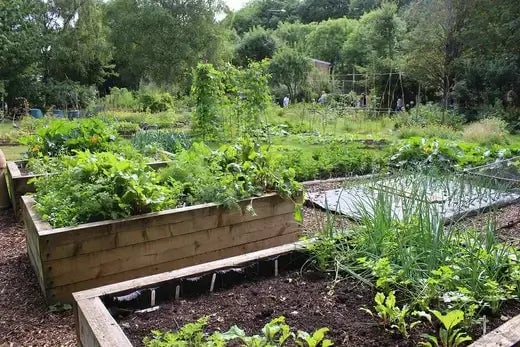Organic gardening has gained significant popularity recently due to its sustainable and eco-friendly approach to cultivating plants and vegetables. By avoiding the use of synthetic chemicals and focusing on natural methods, organic gardening not only yields healthy and nutritious produce but also supports the environment.
Soil is the most important part of a garden
1. Soil Enrichment: Healthy soil is the foundation of a successful garden. Begin by testing your soil's pH and nutrient levels. Organic matter like compost, aged manure, and cover crops can be added to improve soil structure, water retention, and nutrient content. It creates a thriving environment for plants to grow robust root systems and access essential nutrients.
2. Companion Planting: Companion planting involves strategically placing plants with beneficial interactions near each other. For instance, planting marigolds among vegetables can deter pests, and growing beans next to corn can improve nitrogen levels in the soil.
3. Biodiversity: Diverse gardens are more resilient against pests and diseases. Plant various crops to discourage the buildup of specific problems that target certain plants. Additionally, a mix of flowers, herbs, and vegetables can attract insects like bees and ladybugs, which aid in pollination and pest control.
4. Mulching: Mulching is a valuable technique that conserves soil moisture, suppresses weed growth, and maintains a steady soil temperature. Organic mulches such as straw, leaves, and wood chips gradually break down, enriching the soil with nutrients. Mulching also prevents soil compaction and erosion.
5. Natural Pest Control: Integrated Pest Management (I.P.M.) uses natural predators, traps, and physical barriers to control pests. Introduce beneficial insects like ladybugs, lacewings, and parasitic wasps to keep pest populations in check. Insecticidal soaps, neem oil, and garlic sprays can deter pests without harming beneficial insects.
6. Water Management: Efficient watering is crucial for a successful organic garden. Water deeply and less frequently to encourage profound root growth and minimize water wastage. Consider using a drip irrigation system that delivers water directly to the plant roots. Collect rainwater in barrels to conserve water and provide plants with chlorine-free hydration.
7. Crop Rotation: Rotate crops annually to prevent soil-borne diseases and maintain soil fertility. Different plant families have additional nutrient requirements, so rotating crops helps balance nutrient depletion. For instance, follow a nitrogen-demanding produce like tomatoes with a nitrogen-fixing legume like beans.
8. Homemade Compost: Creating your compost from kitchen scraps, yard waste, and plant trimmings is a cornerstone of organic gardening.
Regularly amending your garden with compost promotes overall soil health and plant growth
Composting transforms organic materials like fruit and vegetable peels, coffee grounds, eggshells, and even paper towels into nutrient-rich soil conditioners that benefit your plants and the environment. To begin the process, designate a composting area in your backyard or use a compost bin if space is limited. This will be the spot where you'll pile up your kitchen scraps. If you're using a compost bin, ensure it's well-ventilated and easy to access.
Start collecting kitchen scraps daily. It includes fruit and vegetable scraps, coffee grounds, tea bags, eggshells, and crushed nutshells. Avoid adding meat, dairy, and oily foods, which can attract pests and slow composting. You can add yard waste like leaves and grass clippings to balance the compost mixture. As you collect kitchen scraps, aim for a good balance between "green" and "brown" materials. "Green" materials are nitrogen-rich and include kitchen scraps. In contrast, "brown" materials are carbon-rich, including leaves, paper, and cardboard.
Layering these materials creates the right conditions for decomposition. Shred or chop larger scraps to speed up the process. Turn the compost pile regularly to aerate it and promote even decomposition. It can be done with a pitchfork or a compost aerator. Aeration prevents the bank from becoming too compact and encourages the growth of beneficial microorganisms that break down the organic matter.
Maintain the correct moisture level in the compost pile. It should feel like a damp sponge, not too wet or dry. If the bank becomes too dry, add water; if it's too wet, mix in some dry leaves or straw. The heat helps kill pathogens and weed seeds. As the materials break down, the bank will shrink in size and develop a dark, crumbly texture. After a few months to a year, depending on factors like temperature and pile management, your kitchen scraps will have transformed into rich, dark compost.
This compost can be added to your garden beds to improve soil structure, retain moisture, and provide essential nutrients to your plants. In conclusion, creating compost from kitchen scraps is a rewarding and environmentally friendly practice. It diverts organic waste from landfills, reduces greenhouse gas emissions, and enhances soil health.
9. Weeding Strategies: Weeds compete with plants for resources and can harbor pests. To prevent their spread, regularly remove weeds before they go to seed. Using mulch and practicing "stale seedbed" techniques, where you disturb the soil to encourage weed seeds to germinate before planting, can help manage weed populations.
10. Preserve Wildlife: Encourage natural biodiversity by creating habitats for wildlife in your garden. Birds, frogs, toads, and beneficial insects like bees and butterflies contribute to a balanced ecosystem. Incorporate bird feeders, bird baths, and native plants to provide food and shelter for these creatures. In conclusion, organic gardening offers a holistic and environmentally friendly approach to cultivating a diverse range of plants.
Focusing on soil health and natural pest control in your garden.
Remember that organic gardening is a journey of learning and adaptation, so don't be afraid to experiment with different techniques and observe the results in your garden. With dedication and a deep appreciation for nature's processes, you can enjoy the rewards of a flourishing organic garden for years.
Types of Plants That Flourish Most in Organic Gardening
Organic gardening attracts substantial interest because people want to grow food through healthier and more sustainable methods. Organic gardeners create thriving conditions for particular plant species through natural fertilization techniques, pest control methods, and soil enrichment strategies. This section highlights the leading plant categories that achieve the best growth in organic gardens and explains their compatibility with organic practices.
Organic gardens allow leafy greens like spinach, lettuce, kale, and Swiss chard to thrive. Combining quick growth and shallow root systems helps plants use nutrient-dense compost-enriched soil. Well-aged manure and worm castings deliver the perfect blend of nitrogen, phosphorus, and potassium, promoting the healthy growth of leafy vegetables. Leafy greens need constant nitrogen because they are harvested for their foliage, and organic soil amendments provide this nutrient effectively. Leafy greens tolerate partial shade while growing rapidly, protecting them from pests through smart crop rotation and companion planting.
Carrots, beets, radishes, and turnips significantly grow in organic garden settings. Root vegetables develop evenly and deliver superior taste and texture when planted in loose soil rich in organic material. Mulching root vegetables with straw or leaf mold helps maintain soil moisture and control temperature. Root vegetables need consistent moisture for optimal growth, and leaf mold is frequently used in organic gardening. Preventative techniques, including crop rotation, trap cropping, and proper soil management, form the foundation of effective pest control for root vegetables. When these prevention strategies are implemented correctly, root vegetables experience reduced pest problems from wireworms and nematodes. The plants produce strong and premium harvests naturally because they do not require chemical treatments.
Organic gardeners consider tomatoes their top plant choice since they respond exceptionally well to organic cultivation techniques. The distinct taste of tomatoes grown organically at home proves impossible to reproduce through standard agricultural methods. Tomatoes thrive in organic soil because their microbial richness enables them to absorb essential nutrients and establish robust root structures. Homegrown organic fertilizers and compost tea treatments lead to healthier plant foliage while increasing fruit yield. Tomato plants remain healthy through natural pest control methods, including ladybugs for aphid control and neem oil to prevent fungal growth while avoiding synthetic chemicals that harm soil health and garden biodiversity.
Peppers, including sweet bell and chili types, show excellent growth outcomes when grown using organic methods. Like tomato plants, peppers need nutrient-dense soil, abundant sunlight, and steady moisture. Peppers achieve high yields and intense flavor profiles when grown in rich organic material environments alongside natural pest control methods. Organic gardening techniques like companion planting show substantial benefits when applied to pepper cultivation. Companion planting peppers alongside basil, onions, or marigolds result in pest deterrence while boosting plant vigor.
Organic systems create optimal growing conditions for Mediterranean herbs like rosemary, thyme, oregano, and sage. The volatile oils and powerful scents of these herbs have natural pest-repelling properties. The growth of these plants benefits from the richness and vitality of a well-managed organic garden despite not requiring overly fertile soil. When gardeners create proper soil structure through compost use and ensure good garden drainage, they achieve herb plants with enhanced flavor and resilience. Absent synthetic chemical residues on herbs' leaves are crucial for culinary and medicinal applications.
Blueberries, raspberries, figs, and dwarf apple trees, as well as other fruit-bearing shrubs and small trees, show positive growth responses when managed with organic methods. Fruit species need precise soil conditions for optimal growth, and organic materials such as compost and aged manure provide customizable solutions to meet these needs. Blueberries require acidic soil conditions that can be created naturally with additions like pine needles or peat moss. Fruit plant problems like pests and diseases become less prevalent when gardeners promote soil biodiversity while keeping the ecosystem balanced. The organic environment draws birds, insects, and other wildlife, which controls pest populations and leads to abundant harvests of pure, chemical-free fruit.
Legumes like peas and beans serve as foundational crops in organic gardens. Through symbiotic relationships with beneficial bacteria, legumes transform nitrogen into soil nutrients, enhancing the earth for subsequent planting cycles. Their capability to fix nitrogen makes legumes ideal for crop rotation in organic farming. By growing peas or beans during one season, gardeners establish favorable growing conditions for more nutrient-demanding crops next season while avoiding synthetic fertilizers.
Plants that succeed in organic gardens typically utilize nutrient-rich soil and natural pest controls supported by a beneficial ecosystem. Organic gardening methods enhance plant health and flavor while increasing productivity across various crops, including leafy greens and root vegetables, tomatoes, and peppers, as well as through hardy herbs, fruit-bearing shrubs, and nitrogen-fixing legumes. Organic gardeners develop natural-like conditions that foster diverse soil biology, appropriate pest management, and nutrient balance to enable many plants to prosper. The outcome of these methods produces abundant nutrition-rich fruits and vegetables while maintaining environmentally sustainable harvesting practices.
Read more

Garden Plants Can be Fun and Easy:Organic gardening is a hobby that requires a green thumb and helps you get in touch with nature. The goal is to grow food free of pesticides. It is challenging, bu...

Gardening is one of the most significant pastimes of all time. Having and maintaining a garden is not only a great way to stay healthy, as it requires physical involvement, but it is also one of th...


